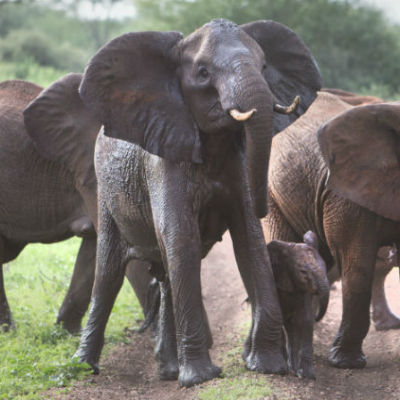Big wins for wildlife
BIG WINS FOR WILDLIFE
Dr Mark Jones, Born Free’s Head of Policy, recently attended an important global wildlife meeting in Switzerland. Covering everything from the trade in live, baby elephants to rare Sri Lankan lizards, he looks back on the successes of the meeting
Recent news on the state of the world’s wildlife and biodiversity has been sobering. A report by more than 150 scientists from 50 countries, released earlier this year, highlighted there are more than a million species at risk of extinction.
Attention on an important global meeting on international trade in wild animals and plants, was therefore particularly intense. The meeting, which took place in Geneva, Switzerland, was attended by delegations from more than 150 governments, alongside representatives from intergovernmental and non-government organisations (including Born Free), trade bodies, and the media. Some 57 proposals to either tighten or relax rules on the trade of many species of wild animals and plants were considered, along with many proposals aimed at changing the way international wildlife trade is managed.
The three-yearly meeting often comes in for criticism for being too political and for lacking independent oversight. However, it is also vitally important, since it is one of the few international environmental agreements that is legally binding.
This meeting proved to be one of the most successful for wildlife, with key decisions made that Born Free has worked hard on for many years.
A number of species were given the highest protection from international trade. These included: small-clawed and smooth-coated otters, two Asian species threatened by the exotic pet trade; Africa’s black-crowned cranes; a number of species of rare endemic Sri Lankan lizards popular among exotic pet keepers in Europe and beyond; Grenadines clawed geckos; several Asian turtle and tortoise species that have been devastated by commercial trade; and two species of swallowtail butterfly. Protection for Saiga antelopes was also increased.
Trade in some species will now be regulated and monitored, including Giraffes, mako sharks, guitarfishes, wedge fishes and teat fishes (a type of sea cucumber), Reeve’s pheasants in China, additional Sri Lankan lizards, a number of gecko species, spiny-tailed iguanas, several species of newt, and south Asian ornamental spiders. Just as importantly, a number of tree and plant species had their protection increased.
Efforts by some southern African countries to open up international trade in ivory and rhino horn, were roundly rejected, much to our delight. The rules which govern the protection of elephants and rhinos were also tightened, and countries that still allow domestic trade in rhino horn were encouraged to shut down the trade if it risks further poaching of rhinos for their horns. Born Free has campaigned for many years for a global ban in the trade in ivory.
The meeting also agreed that the export of live wild-caught elephants from Zimbabwe and Botswana should be restricted to in situ conservation programmes within the species’ natural range, which should go a long way towards ending the terrible trade in wild-caught elephants to zoos and circuses around the world, which causes of so much animal suffering and disruption.Born Free has worked for a long time to bring this heinous trade to an end, so we are absolutely delighted with this decision. We will continue to work with our partners in Zimbabwe and elsewhere to secure the greatest possible protection for Africa’s remaining wild elephants.
A Big Cat Enforcement Task Force will also be formed to tackle illegal trade in all big cat species. Some progress was made towards ensuring countries with lions collaborate more effectively to conserve dwindling populations of African lions. Important decisions were adopted with respect to trade in tigers and other Asian big cats, with China’s voice being subsumed in a show of support for measures which tighten the noose significantly more around trafficking, breeding for trade and weak domestic regulation.
Of course, not everything went our way, and we were dismayed by some of the grossly inaccurate and at times downright nasty accusations levied at the wildlife protection NGO movement by those whose only aim is to exploit wildlife for commercial gain. Nevertheless, the meeting gives us much to build upon, and some hope that the dire state of the natural world and the need for transformative changes to the way we approach wildlife trade and protection, may finally be starting to filter through into the minds of decision-makers.


